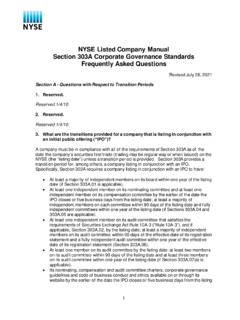Transcription of Chapter 9: Corporate governance
1 Office of the Regulator of Community Interest companies : Information and guidance notes Chapter 9: Corporate governance MAY 2016 Chapter 9 2 Contents Role of Directors and Members .. 3 Corporate governance Overview .. 3 The role of the Director .. 3 Members .. 4 Relationship with other stakeholders .. 6 Directors 7 Key points .. 7 CIC Directors may be paid for their services.. 7 General company law rules in relation to director s remuneration .. 8 The community interest test, the asset lock & remuneration .. 9 Charitable trustees as directors of a subsidiary trading company .. 10 Payment of a charity trustee for services as a director .. 10 What is reasonable remuneration?.. 10 Particular responsibilities, skills and expertise of individual directors.
2 11 Nature, size and performance of the company s business .. 11 Financial position of the company .. 11 Published guidance on good Corporate governance .. 11 Views of stakeholders .. 12 Transparency .. 12 Action by the Regulator .. 13 Directors payments and benefits and Tax returns .. 14 Chapter 9 3 Role of Directors and Members It is hoped and expected that Community Interest companies (CICs) will be formed for a wide range of purposes and will vary in size accordingly. What would be an effective form of Corporate governance for a large international trading organisation would be quite inappropriate for a small CIC formed, say, to hold the assets of another community organisation. These guidance notes cannot therefore set out a standard governance scheme for all CICs to follow.
3 Corporate governance Overview Company law sets out a number of requirements such as the need for a company to have a least one director to maintain financial and statutory records etc. The essentials are dealt with in the companies House booklet Incorporation and Names and Life of a Company Part 1 & Part 2 . The company s own Articles of Association will also contain detailed governance requirements such as the holding of members and directors meetings. Listed companies are required to report on their compliance with the Financial Reporting Council s Combined code on Corporate governance . There are other codes of Corporate governance best practice guidance (such as those issued by institutional investors) which listed companies are encouraged to observe.
4 You should seek professional advice if you are unsure of your obligations in this area. Compliance with the codes etc. (suitably adapted to the CIC s particular circumstances) is seen as good practice for larger CICs, even if not public or listed; For example, the appointment of independent non-executive directors, audit and directors remuneration committees and the separation of the roles of chairman and Chief Executive would all contribute to the transparency of the organisation and stakeholder confidence. However, such structures may be disproportionate, costly and unwieldy for smaller CICs but regard should be had to establishing clear structures for the governance of the CIC and in particular the involvement of stakeholders (see Chapter ).
5 Whatever structure is adopted, it is up to the directors and members to ensure it is complied with and is in the best interest of the CIC and its community. In serious cases, the Regulator has the power to take legal action in the name of the company, but the Regulator is unlikely to be in a position even to consider doing this unless the members, in particular, take their governance responsibilities seriously. The role of the Director As with any other company, the directors of a CIC occupy an important position of trust and general company law imposes on them a range of duties to the company and other responsibilities. The directors (and in some circumstances the secretary) are also responsible for ensuring that the company meets its statutory and other obligations.
6 In Chapter 9 4 some cases the company can hold the directors personally responsible for defaults and can be prosecuted or subject to disqualification proceedings. In addition to these general responsibilities CIC directors (and, when they take collective decisions about the company, members) are also responsible for ensuring that the company is run in such a way that it will continue to satisfy the community interest test. In practice, this will mean having regard to the interests of the community the CIC is intended to serve, and in some cases giving more weight to those interests than to generating financial returns for investors in the company. In most companies the day to day management of the company is in the hands of the board of directors although certain functions may be delegated to specific directors, such as the chief executive or financial director, or reserved to the members.
7 As a company gets larger the direct control of daily activities by directors becomes more difficult and functions have to be delegated to employees. It is essential to good governance that the directors clearly establish the lines of delegation. The authority and responsibility of those given delegated power need to be established and systems of control, including where appropriate internal audit, must be set up. It must be remembered that the term director includes anyone who performs the role of a director whether formally appointed or not. A person who directs the policy and makes major decisions with regard to the company may therefore be regarded as a de facto director or a person upon whose instructions the appointed directors act (excluding those giving professional advice) may be regarded as a shadow director.
8 It is therefore particularly important with CICs where stakeholders are encouraged to participate in running the organisation to clearly establish people s respective roles (see Chapter ). It is also important not to take on the role of director lightly; it is not a matter of status but a commitment to take on an important role and obligations. In particular, it should be noted that, while it is often a good idea to have non-executive directors, who do not work full-time in the business, but who have particular skills and experience and can contribute an independent perspective to the management of the company, if things go wrong (particularly if they have not performed their duties diligently) they may well be held equally liable for any consequences with the executive directors.
9 Members In a company limited by shares the members are usually the shareholders subject to the provisions included in the Articles of Association. In a company limited by guarantee the members are usually the subscribing guarantors and others admitted to membership according to the Articles of Association. Although the day to day running of the company may be delegated to the directors, subject to company law and the Articles of Association of the company, the ultimate control of the CIC and responsibility for major policy and other decisions rests with the members. The general meeting of a company s members is its ultimate decision-making body, and members have statutory rights to require the company to call such meetings. Chapter 9 5 For example, they can appoint and dismiss the directors, delegate powers to the directors, declare dividends, approve major transactions and change the constitution of the company (see Chapter 5).
10 In all companies , but more so with CICs, members should not regard delegation to directors as being the same as abdication of responsibility. It is important that the members should monitor the performance of the CIC and the directors, for example, to satisfy themselves that the company continues to meet the community interest test and fully involves the community in its activities and development As explained further in Chapter 11, the light touch regulatory regime operated by the Regulator means that, to a large extent, the Regulator relies on others to bring to the Regulator s attention any matters causing concern about the activities of a CIC. The members clearly have a role to play in drawing such concerns to the attention of the Regulator who will consider whether the Regulator should take any action.















